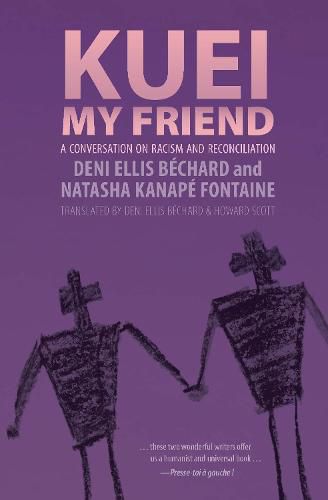Readings Newsletter
Become a Readings Member to make your shopping experience even easier.
Sign in or sign up for free!
You’re not far away from qualifying for FREE standard shipping within Australia
You’ve qualified for FREE standard shipping within Australia
The cart is loading…






Idle No More, Truth and Reconciliation Commission, National Survey of Missing or Murdered Aboriginal Women … How can we co-exist if our common history is shame, injury, and anger? How can we counteract the misunderstandings of the other that lead to contempt? How can we make whites realize the invisible privilege that results from historical domination and the impact of cultural genocide on Indigenous peoples? In an attempt to open a dialogue, Kanape Fontaine and Bechard use personal stories to understand words and behaviors that are racist or that result from racism. In this epistolary exchange, Kanape Fontaine recounts her discovery of the residential schools, her obsession with the Oka Crisis, and life on the reserve in Pessamit, Quebec; Bechard talks about his father’s racism, the segregation of African-Americans, and his identity as a Quebecois living in the English-speaking world. By sharing honestly even their most painful memories, these two writers offer a humanist and universal book on the relationship to the other and the respect for difference.
$9.00 standard shipping within Australia
FREE standard shipping within Australia for orders over $100.00
Express & International shipping calculated at checkout
Idle No More, Truth and Reconciliation Commission, National Survey of Missing or Murdered Aboriginal Women … How can we co-exist if our common history is shame, injury, and anger? How can we counteract the misunderstandings of the other that lead to contempt? How can we make whites realize the invisible privilege that results from historical domination and the impact of cultural genocide on Indigenous peoples? In an attempt to open a dialogue, Kanape Fontaine and Bechard use personal stories to understand words and behaviors that are racist or that result from racism. In this epistolary exchange, Kanape Fontaine recounts her discovery of the residential schools, her obsession with the Oka Crisis, and life on the reserve in Pessamit, Quebec; Bechard talks about his father’s racism, the segregation of African-Americans, and his identity as a Quebecois living in the English-speaking world. By sharing honestly even their most painful memories, these two writers offer a humanist and universal book on the relationship to the other and the respect for difference.